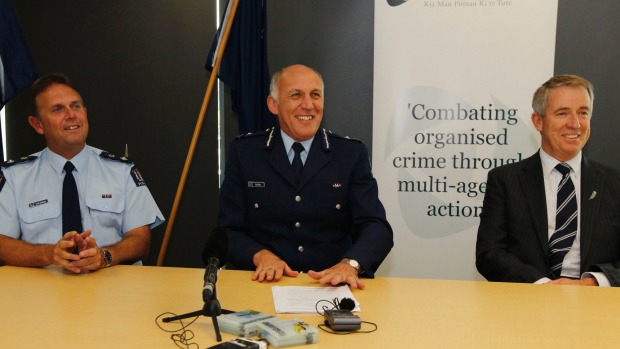
Former Tasman police district commander, Superintendent Gary Knowles (left), former deputy commissioner of Police Rob Pope, and former OFCANZ director Malcolm Burgess (right) were all smiles at a news conference regarding Operation Explorer in March, 2011. In 2014 Burgess and Knowles are again grinning like two fat Chesire cats having managed to pull the wool over the eyes of the IPCA, oh and the Kiwi media.
Over the past week the mainstream media in New Zealand have provided yet another example of how it is Kiwi journos support the New Zealand police by seemingly avoiding the need to ask hard questions and or making the effort to flush out obvious corruption within the New Zealand police force. We say obvious simply because in most cases you don’t have to have much more than a keen eye and be able to read between the lines of what little the Kiwi media does provide in their deliberately disjointed fashion to establish prima facie that something untoward has yet again occurred in the land of the long white shroud. But as always, a lot more than the media have let on.

Superintendent Rodney Drew, up to his neck in this the latest criminal offending by New Zealand’s police, yet another conspiracy, lies and legal obfuscation.
For example, last thursday Fairfax’s Christchurch Press published a small story on Christchurch district commander Inspector Gary Knowles. That story reported on the inexplicable exoneration of Knowles in an IPCA inquiry born of a complaint filed by one of Knowles subordinate police officers. Of course as is par for the course neither the police, the IPCA or the press were willing to name the officer concerned (team LF have highlighted a number of areas in the text and names that readers should ensure they note):
Inquiry clears Superintendent Gary Knowles of wrongdoing
BLAIR ENSOR
Last updated 05:00, May 23 2015Departing Canterbury district commander Superintendent Gary Knowles has been cleared of any wrongdoing after a police officer complained he had been maliciously prosecuted.
The constable, aged in his 30s, was charged with assault in February last year after an incident involving an arrested man at the Timaru police station in 2013.
The officer pleaded not guilty. The prosecution withdrew the charge at a court hearing in April last year after reviewing the evidence.
The constable complained to the Independent Police Conduct Authority (IPCA) alleging he was maliciously prosecuted because of a decision made by Knowles.
The authority asked police to investigate on its behalf. Assistant Commissioner Malcolm Burgess oversaw the inquiry.
The IPCA has since completed its review of the case but would not discuss the outcome.
Burgess said the investigation found Knowles had reached his decision to charge the officer based on the evidence presented to him and on legal advice that there was enough evidence to proceed.
“I am satisfied that … I would have reached a similar view as the district commander with regards to the decision to prosecute.”
Burgess said the charge against the constable was incorrectly laidoutside the timeframe specified by the Summary Offences Act. The charge should have been one of common assault under the Crimes Act, he said, because that was the only option available.
“I am satisfied that Superintendent Knowles has acted entirely properly … and I consider this matter to be now closed.“
Knowles said it was important that all police staff, regardless of their position, were held to account for their actions.
“Cases such as these are always challenging, and it is important that the difficult decisions we make as police officers stand up to all appropriate scrutiny when required.”
The constable who made the complaint declined to comment when contacted this week.
His lawyer, Grant Cameron, had concerns about the independence of the investigation.
He believed the IPCA should have investigated the constable’s case itself or appointed someone independent.
“We will be in communication with the IPCA about their approach to allowing senior police to investigate senior police,” Cameron said.
An IPCA spokeswoman said the case was “deemed suitable for police investigation with proactive oversight by the authority and an independent review of the police investigation at conclusion.
“The authority remains of the view that this was appropriate in the circumstances.”
She said the authority received more than 2000 complaints each year and its resources and ability to investigate matters were limited.
Knowles was appointed Canterbury district commander in 2011. He is leaving the role to represent New Zealand Police in Thailand as a police liaison officer – a role with an emphasis on terrorism.
Superintendent John Price starts in the position early next month.
The above article was first published on the 22nd May this year (in NZ) and tweeted a little later by a member of team LF. There are a number of things that stand out immediately in the press article, patterns that anyone with even an ounce of legal knowledge would be quick to question.
First on the list is of course the decision taken by Gary Knowles to lay the police charges against his subordinate officer under the summary offences Act, a statute in which there exists a six month limitation. Second up, the fact that Inspector Knowles claims to have sought legal opinion before having taken that decision – Whilst neither the police, IPCA, nor again the press have given the public any idea of who had been responsible for giving Knowles the legal advice he has purportedly now claimed to have received.
Knowing how the Christchurch police operate however the legal advice, if any was in fact obtained, would have undoubtedly come from one of only two sources, either Ian McArthur of Christchurch police legal services or a partner or staffer of Raymond Donnelly & Co, the Christchurch and West Coast crown solicitor warrant holder and of course home to the infamously corrupt crown prosecutor Brent Stanaway, the man responsible for the Gwaze and Peter Ellis injustices among so many other New Zealand miscarriages.
Third up we have the matter of the “30 something” un-named Timaru constable that inspector Gary Knowles decided to charge based on his purported legal advice. As aforesaid there seems a definite reluctance by all concerned to name the officer. We are however given a number of so-called facts by the journalist. The first set of facts relate to the origin and approximate dates of the incident from which the charge Knowle’s laid stemmed. Again however the journalist has assisted police by failing to provide enough detail for the reader to readily identify the case and the officer, if in fact it had been reported in the media at the time.
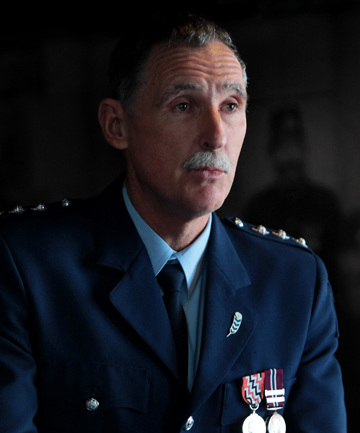
Mid-South Canterbury area police Commander Inspector Dave Gaskin, himself under the spotlight in 2011 over his corrupt handling of the Troy Rueben case
Back in 2014 LF published a piece listing all of the published accounts of incidents that had involved police wrongdoing since 2008. Among that list we managed to locate what we believe to be the only case that fits most of the circumstances, as set out by the journo in the above news article, although admittedly there are a number of differences in the facts presented, the differences could be seen as the result of omission as apposed to a more significant discrepancy.
There has in fact only been two Timaru based events that have resulted in any investigation or legal actions against police officers in the period cited by the journalist, at least only two that appear in contemporary media reports. The first surrounded the 2011 tasering of Troy Reuben, the second the laying of three charges against one Timothy Phillip Hartnell, a police constable based in Pleasant Point, a small community a few kilometres South West of Timaru.
Officers under investigation over false evidence
October 10, 2014
At least four police officers – including the Area Commander for Mid-South Canterbury – are under investigation in relation to false evidence in court.
The Independent Police Conduct Authority has found the use of the taser against Timaru man Troy Reuben was excessive, and that two officers involved knowingly lied while giving evidence in court.
It also found the Police Prosecutor failed in his duty to ensure correct evidence was permitted in court – and he was potentially told to go ahead by Inspector Dave Gaskin.
Assistant Commissioner Allan Boreham says the investigations are wide ranging.
“We’re doing an inquiry which will look at all the actions of all the people involved whether it’s people who gave evidence or people who gave them advice on that evidence.”
Source: NewsTalkZB
The dates surrounding the Troy Reuben case seem to fall well outside the dates cited in the above a Christchurch Press article which only then leaves the case of constable Timothy Hartnell and the three assault charges he was facing in March 2014. Of course it may well have been charges that were secretly laid against Timaru commander Dave Gaskin for example, but if so such an event was never made public.
In the Hartnell case there where three charges laid by police, not one as set out in the above Christchurch Press article. This could however, as aforesaid, be a simple case of deliberate omission.
The Hartnell investigation and prosecution falls inside the time frames cited, the complaint was also transferred from Timaru and investigated by Christchurch police and the subsequent charges laid by Christchurch police not Hartnell’s commanding officer in Timaru, Inspector Dave Gaskin.
Further two of the three charges that Hartnell faced as at March 2014 were later withdrawn by the police in June 2014 prior to Hartnell’s trial in August 2014 wherein he faced a single charge. Hartnell was of course found guilty of assault, but discharged without conviction.
Again all of the facts fit, bar the small issue of the total number of charges that Hartnell might have been facing and a few weeks discrepancy in the dates attributed to court fixtures. Of course Hartnells IPCA complaint, again if it was Hartnell, may well have related to just one of the two charges that were withdrawn by police in June 2014, or alternatively the journalist may have based his story on intentionally misleading information supplied in a Christchurch police press release, which is unfortunately quite often the case with New Zealand police spin doctors.
In every other respect however the facts in the case of constable Timothy Phillip Hartnell do fit the bill:
Former police officer denies assault charges
DAVID CLARKSON
March 04, 2014A former South Canterbury police officer is denying three charges of assault and the case is heading for a Christchurch District Court trial.
The officer, Timothy Phillip Hartnell, of Pleasant Point, did not need to appear before a judge at the Court House in Christchurch today as the remand had been arranged through a registrar prior to his scheduled appearance.
After his indication of not guilty pleas, the remand was granted to a case review at the Christchurch District Court on May 13. That review session is likely to settle arrangements for a defended hearing to be held.
An investigation was conducted from Christchurch after a local complaint from a member of the public in November, and the case was transferred from Timaru.
Hartnell has since resigned from the police.
Source: Christchurch Press, Stuffed.co.nz
—–/—–
Ex-cop faces single charge
June 24, 2014
Police have dropped two assault charges against a former South Canterbury police officer but a third charge still may be heading for a judge-alone trial.
The trial of Timothy Phillip Hartnell, of Pleasant Point, will be held in Timaru, with the police now listing 15 witnesses to be called.
Hartnell resigned from the police after the three assault allegations.
He appeared at a case review hearing before Judge Paul Kellar in the Christchurch District Court yesterday for trial arrangements to be set.
Police prosecutor Glenn Henderson asked for the two assault charges to be withdrawn and that application was granted by the judge.
The third case relates to an alleged assault on a youth who ran off when being spoken to about riding a bicycle on the footpath.
The case has now been remanded for another hearing in the Christchurch District Court on August 18, without a trial date being set.
Source: Timaru Herald, Stuffed.co.nz
—–/—–
Handcuffed for riding on the footpath
ANNE CLARKSON
August 18, 2014
A former police officer has been discharged without conviction for assault charge relating to handcuffing a young man who rode his bike on the footpath.
As a police officer, Timothy Phillip Hartnell had a problem with people riding bikes on the pavement in Pleasant Point, a town near Timaru in South Canterbury.
Judge Jane Farish said Hartnell had stopped the young man by grabbing his backpack. The youth slipped the bag off and ran away. Hartnell chased him; he fell over and had a bleeding nose when Hartnell caught him. Hartnell handcuffed him and took him home to his mother.
A complaint was laid with the police the next day. Hartnell resigned and moved out of the district.
Judge Farish today at the Christchurch District Court ordered Hartnell to write an apology letter to the young man.
She said Hartnell had a blameless character, and a conviction would have significant consequences for him and the community he now voluntarily served. The effect of a conviction would be out of proportion with the gravity of the offence, the judge said.
She said the young man’s victim impact report said he had been scared and had not ridden his bike since this incident. He was anxious and apprehensive of the police.
Hartnell was discharged without conviction.
Source: Stuffed.co.nz
This then leads us to the question of a comment made by the lawyer representing the ex police officer we now suspect to be Timothy Hartnell. Christchurch lawyer, Grant Cameron, is qouted as saying; “We will be in communication with the IPCA about their approach to allowing senior police to investigate senior police,”.
Now we here at LF have no way of knowing, beyond the obvious conflicted interests inherent in a senior cop investigating another, whether Grant Cameron has anything specific in mind that he requires the IPCA to answer. We do suspect however that if he didn’t then that situation is about to change.
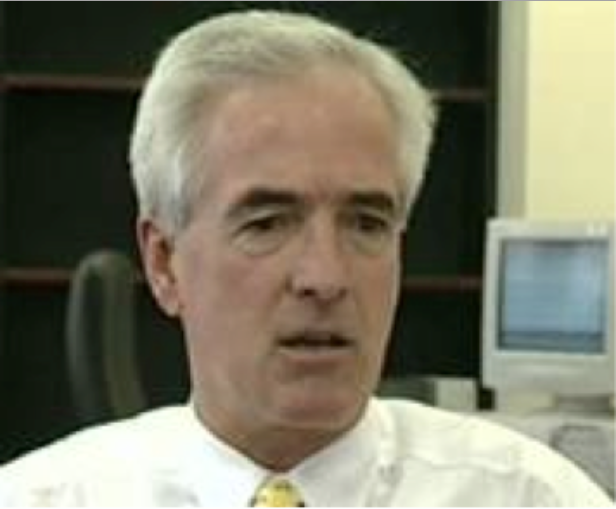
IPCA chief investigator bent ex cop Pieter Roozendaal who left the Police under the shadow of a corruption and racial abuse inquiry is a dab hand at ebsuring enquiries into his mates bad behaviour lead nowhere.
The man responsible for all investigations the Independent Police Conduct Authority investigates and how those investigations are undertaken is not the chairman Judge Sir David J. Carruthers. It is in fact ex cop Pieter Roozendaal who was appointed to the roll of chief investigator at the IPCA in 2011 following his departure from the New Zealand police in large part as a result of his own corrupt and inappropriate behaviour. If interested readers can find a little info on ex inspector Pieter Roozendaals history with the New Zealand police amongst LF’s pages. Suffice to say Roozendaal should never have been selected for such an important job requiring independence and objectivity.
Aside from the fact that it would have been Roozendaal’s call to have another senior cop investigate Gary Knowles there are also questions that need answering around the selection of the officers then charged with that investigation, in particular Assistant Commissioner Malcolm Burgess.
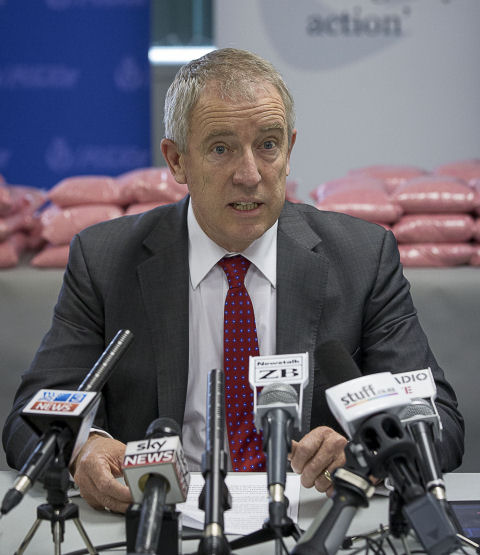
Assistant Commissioner Malcolm Burgess, just why was it that the police were investigating their own corrupt officers? Which idiot at the IPCA thought it okay that Bugess should be selected to investigate fellow operation Holy/Explorer conspirator Gary Knowles?
In fact the fact that Burgess was the man responsible for acquitting Gary Knowles of any wrong doing can only be seen, at best, as a seriously bad judgement call, or as we suspect overt corruption at the highest levels of the New Zealand police force. The lawyer handling his clients complaint against Knowles, Grant Cameron, was indeed right to question the appropriateness of senior cops investigating each other. We suspect that IPCA chair might also need a little guidance on what constitutes a conflict of interest
“I am satisfied that Superintendent Knowles has acted entirely properly … and I consider this matter to be now closed.” – Assistant Commissioner of Police Malcolm Burgess
Of course the above questions would be raised by any interested citizen, requiring absolutely no inside knowledge to be alerted to the fact that something has been amiss from day one of the police investigations, first into the un-named constable who we now suspect to be Timothy Hartnell and then into area commander Inspector Gary Knowles agenda.
The first question is so obvious that you could pin a tail on it and call it a rat.
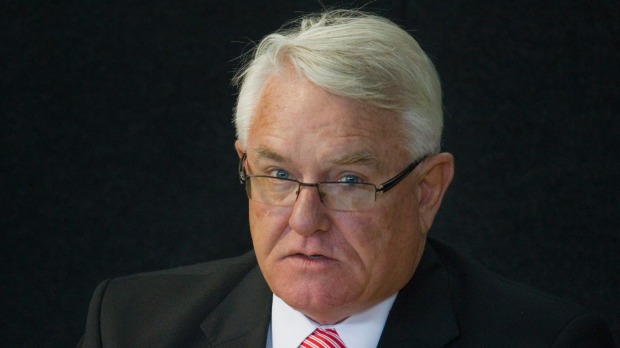
Lawyer Grant Cameron, was indeed right to question the appropriateness of senior cops investigating each other, the practice is little more than an invitation to corrupt practice, especially under the conditions currently found in New Zealand.
There is absolutely no plausible explanation whatsoever that could possibly explain away Gary Knowles decision, if you are to believe the IPCA report, having taken legal advice, to lay charges under New Zealand’s Summary Proceedings Act well outside that Acts inherent six month statutory limitation other than the fucking obvious; that Knowles and his legal advisors wanted the charges to fail at the first hurdle, that the police had laid the charges under the Summary Proceedings Act, knowing full well that they would collapse and thus forfeit any chance of a successful prosecution.
The fact is that the implied incompetence on the part of police is so damning as to be completely and utterly implausible, whether or not it was Timothy Hartnell that had been charged it is quite obvious that it was Gary Knowles intention from the start to let the accused police officer walk away scott free whilst Knowles himself at least appeared to have done his job! Frankly the repetitiveness and simplicity of this hackneyed police strategy of exculpation is sickening – as is the New Zealand mainstream medias continuing willingness to either fall for or go along with the ploy.
Putting aside the issue of failed police prosecutions we now come to the matter of the inherent conflict of interest, the police abuse of process and corruption in the related Red Devils case, a relationship that’s to be found in the close working association that Knowles had with OFCANZ director Malcolm Burgess when the pair decided to commit criminal acts in an attempt to save their so-called undercover operation.
Here too there are questions requiring credible answers, required both by those who do have inside knowledge of and were affected by the events and ordinary citizens concerned about corruption. Again we have highlighted a few names and some of the text which readers should again take care to note;
Police behaviour in Red Devils gang case possibly criminal, says judge
JONATHAN CARSON
Last updated 13:17, May 23 2015A flawed police undercover operation has ended with a judge throwing out all but a handful of charges against members of the Nelson-based Red Devils.
The word in Motueka was that two agents were in town.
The Red Devils motorcycle gang had names: Mike and Kasey. It was May 21, 2010, when police heard the rumours.
The two undercover police officers, who had been posing as a couple and slowly infiltrating the Red Devils in Nelson since November 2009, were known as Michael Wilson and Kasey Robinson.
Former Tasman police district commander, Superintendent Gary Knowles (left), former deputy commissioner of Police Rob Pope, and former OFCANZ director Malcolm Burgess (right) were all smiles at a news conference regarding Operation Explorer in March, 2011.
The Red Devils were suspicious and police were concerned that their investigation into the gang’s alleged criminal activities, Operation Explorer, was under threat.
A patched Red Devils member at a poker run in March, 2013.
Nelson Mail Photographer
A patched Red Devils member at a poker run in March, 2013.So police concocted a plan to bolster the undercover officers’ credibility within the gang.
That plan, known as the fake warrant and prosecution scenario, has all but sabotaged the case against the Red Devils.
A High Court judge this week threw out all but a “small number” of charges laid against members and associates of the Red Devils following an 18-month police undercover operation.
This comes after Justice Collins formally dropped 116 charges against 18 defendants last month.
It is understood that as few as four charges against three defendants remain, however lawyers said on Friday that they were not sure of exact numbers. There were originally 148 charges against 21 defendants.
Five years after police’s fake warrant and prosecution plan, Justice Collins has ruled that it amounted to grave misconduct, possible criminal offending and misuse of the justice system.
Justice Collins gave four reasons for why the charges are stayed:
* The gravity of police misconduct during Operation Explorer
* The causal connection between the misconduct and evidence obtained by police
* Maintaining public confidence in the criminal justice system
* Protecting the criminal justice system from being “degraded” and “misused”
THE ‘FAKE WARRANT SCENARIO’
Early in May 2010, Red Devils prospect Mike Tulouna, who had 81 convictions and a reputation for intimidating behaviour, asked Wilson how he earned his money.
Tulouna said the Red Devils wanted assurance Wilson wasn’t a police officer.
Soon after, Wilson involved Tulouna in an illegal paua selling operation. It was an attempt to prove he was a crook, not a cop. But it wasn’t enough.
Under the leadership of Detective Inspector Grant Wormald, Detective Senior Sergeant Warren Olsson and Detective Sergeant John Mackie, police devised a plan.
Police prepared a fake search warrant and an officer signed it in the place reserved for the signature of a court registrar.
It was arranged for Wilson to rent a storage unit in Motueka and police planted apparently “stolen” laptops, ammunition and drug paraphernalia inside.
Police used the false warrant to search the storage unit and arrested Wilson outside the Red Devils clubrooms in Nelson.
Wilson was fingerprinted, photographed, charged and appeared in court before several judges who all believed they were dealing with a genuine case.
The ruse was created to bolster Wilson’s credibility within the Red Devils and it worked.
But justice Collins said the scenario “involved police engaging in significant misconduct” and was “pivotal to the police gathering evidence against the defendants”.
“But for the false warrant and prosecution scenario, the police are unlikely to have gathered much of the evidence that underpins the charges in relation to offending said to have occurred after the commencement of the scenario.”
He said the the police misconduct may have amounted to serious criminal offending.
“Had a private prosecutor engaged in similar tactics he or she could expect to face the full wrath of the criminal justice system.”
Justice Collins said there was a causal connection between the police misconduct and evidence obtained following the false warrant scenario.
Because that evidence was improperly obtained, he has ruled that all charges relying on it are stayed.
PROTECTING THE JUSTICE SYSTEM
Justice Collins said allowing the trial to continue invited the public to believe that the courts condoned the police misconduct. “Nothing could be further from the truth.”
He said staying the charges was “a proportionate and appropriate measure that is required to uphold public confidence in the administration of justice”.
Nelson defence lawyer Tony Bamford, who acted for three defendants, said the decision upheld the “fundamental separation of powers” between police and the courts.
“I think the one thing that is made very clear is the police simply cannot, through a forged warrant and a completely fictitious charge, utilise the court as part of their strategy to enhance their ability to complete or continue an inquiry.”
He said it was a “gratifying” outcome. “In our view, it’s a correct decision.”
Crown Law is yet to decide if it will appeal the decision.
READ MORE:
* Some Red Devils charges are likely to be dropped
* Patched Red Devils in clear
* Lawyers argue for Red Devils case to be thrown outSource: The Nelson Mail/Stuffed.co.nz
The New Zealand Herald also published a piece on the reporting on the High Court decision, albeit that the journalist either did not seem to understand the wider ramifications of the police’s behaviour and its broad application in unlawful prosecutions and or general abuse of process.
For example the police could simply allege that a crime had occurred, deliberately misleading the courts with false affidavits in order to obtain search warrants as an investigative tool or to assist with what was little more than a fishing expedition. Of course there are many examples of this behaviour in history were the New Zealand police have engaged in this behaviour, this case differs only in that the the cops have now been caught red handed.
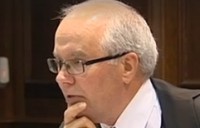
New Zealand High Court Justice David Collins, in our view the most unlikely judge to have outed police corruption and criminal offending, perhaps Collins has read the publics mood correctly at last.
Arguably the current climate that websites such as LF have helped create is also placing more pressure on the courts to avoid being seen supporting, condoning or simply sweeping this type of police corruption and criminality under the carpet.
The New Zealand Herald’s Jared Savage often writes material that seems more tolerant of police abuse of process and malfeasance so the difference in emphasise in the two articles is perhaps a given, Savage opines
Police broke law in Red Devil’s case
Jared Savage
Friday, 22 May 2015
A High Court judge suggested the police “probably” broke the law by faking a prosecution against an undercover officer to boost his credibility with a gang.
Justice David Collins threw out serious charges, including possession and supply of methamphetamine, LSD and cannabis, against seven members and associates of the Red Devils gang in a judgment released yesterday.
In taking the “extreme” step of ordering a stay of proceedings, Justice Collins said
Police were investigating the emerging Red Devils Motorcycle Club, who they suspected were about to become a chapter of the Hells Angels.
During a crackdown dubbed Operation Explorer, police bosses became concerned that an undercover officer known in the gang as Michael Wiremu Wilson was about to be exposed. To strengthen his credibility, police arranged for a fake search warrant of his lock-up in which they had placed apparently stolen equipment and drug paraphernalia.
Police forged an illegible signature of a court deputy registrar and arrested Wilson. He appeared on several occasions before judges who all believed they were dealing with a genuine case.
Detective Superintendent Rod Drew and Detective Senior Sergeant Warren Olsson visited then-Chief District Court Judge Russell Johnston and believed police had his permission to go through with the unprecedented ruse. Soon after Operation Explorer ended, police sought to have Wilson’s charges withdrawn.
In his decision to stay the proceedings, Justice Collins said the false warrant and prosecution scenario involved the police engaging in “significant misconduct”.
He said the police officers who forged the signature of a judicial officer on the ‘search warrant’ and the police officer who signed the fictitious information charging Mr “Wilson” probably committed offences of the imitation of a court document and making a false oath.
Imitation of a court document is punishable by a fine of up to $500, while making a false oath carries a maximum prison sentence of five years.
A senior lawyer for one of the gang members Robert Lithgow, QC, suggested in court the police may also have perverted the course of justice.
“Senior police officers devised the false warrant and prosecution scenario because they believed the ends justified the means,” said Justice Collins.
“Had a private prosecutor engaged in similar tactics he or she could expect to face the full wrath of the criminal justice system.
“These observations are made solely to emphasise the seriousness of the police misconduct. It is not my intention or function to use this proceeding to punish the police.“
Justice Collins concluded that he must take the “extreme” step of staying the proceedings for four reasons.
•The gravity of the police misconduct which involved misuse of the criminal justice system by those responsible for law enforcement.
•The connection between the police misconduct and the evidence which underpinned the charges.
•Allowing the trial to continue implies the Courts condone the police misconduct. “Nothing could be further from the truth”.
•Maintaining the integrity of the criminal justice system to uphold public confidence.
This is the second time the charges against the Red Devils have been thrown out because of the false warrant and prosecution.
In a High Court decision released in October 2012, Justice Simon France ordered a stay of proceedings against the group who were facing a range of charges including drug offences and being part of an organised criminal group.
Justice France said he believed police thought they were acting legitimately, but a letter police gave to Judge Johnston about the situation would have been “wholly inadequate” to alert him to the realities of what was involved.
Justice France said he was surprised at the police’s “lack of insight” in creating a fake search warrant.
“However one looks at it, a fraud is being committed on the courts. The judges who are dealing with it are being treated in a disrespectful way.” At the time, Police Association president Greg O’Connor called the decision “disproportionate and unjustified”.
“Police acted in good faith when taking these measures to protect the agent’s life, and acted with the knowledge and agreement of the then Chief District Court Judge, Russell Johnson, in doing so.
“To have the court now effectively change its mind is a slap in the face for the agent who put his life on the line for over a year.”
In October 2013, the Court of Appeal unanimously overturned Justice France’s stay of criminal charges laid against 20 associates of the Red Devils motorcycle club and the trial was to continue. A key element of the appellate judges’ decision was because there was an understanding there was no connection between the false warrant and prosecution scenario and the evidence obtained by the police to support the charges.
In the most recent decision by Justice Collins, he said there was new evidence which showed there was a connection.
Source: NZ Herald
LF note that neither Fairfax nor APNZ editors have been brave enough to write an opinion piece criticising the police for their own seriously criminal behaviour this time round (The previous editor of the New Zealand Herald, Timothy Murphy, did write a piece back in October 2012 – Murpheys scathing opinion of the police behaviour at that time can be found here or in the reference/bibliography below).
This is particularly relevant given Justice David Collins extremely pointed criticism of the criminal aspect of the police actions. Justice Collin’s a man who during his tenure as Solicitor General was one of New Zealand’s most vocal supporters of police, as one would perhaps expect of an SC, makes little if any effort to disguise his view that there is the ability for the accused to now seek legal redress, although his invitation is obviously guarded and uses the coded language to be expected of the judiciary;
“Senior police officers devised the false warrant and prosecution scenario because they believed the ends justified the means,”
“Had a private prosecutor engaged in similar tactics he or she could expect to face the full wrath of the criminal justice system” .
“These observations are made solely to emphasise the seriousness of the police misconduct. It is not my intention or function to use this proceeding to punish the police.” – Justice David Collins.
Collin’s rightly points to the High Courts inability to pursue the issue of the polices criminal behaviour beyond that which it has in striking out the charges, afterall it’s not the police that were on trial in the event.
Even so that’s not to say that at some point in the very near future the New Zealand police, including the officers culpable of the real criminal offending, may not be put on trial if someone decides to take Collins somewhat surreptitious invitation seriously.
We suspect however that such a criminal proceeding will not be launched by the police themselves, nor for that matter the solicitor general or the Independent Police Conduct Authority (IPCA) as they have little if any real power to do anything. In fact therein lies the problem with the system of accountability in New Zealand. There is no real objectivity or even the powers required to deal with corruption or criminal wrongdoing in a way that would more appropriately hold police to account.
The IPCA, the only organisation that comes even close to an anti corruption body in New Zealand has proven itself to be all but useless since its founding in 1988, the associated cost to taxpayers something akin to throwing good money after bad.
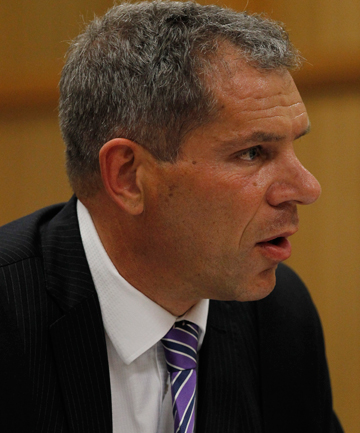
Nelson Lawyer Tony Bamford was screwed by police on two counts, first police deliberately mislead him as an officer of the court and then they refused to pay him for the hours he spent defending their falsely accused undercover operative in a fake prosecution – LF suspects Bamford might just be the right man to front a private prosecution!
If the police are to be held to account for their obvious corruption, in fact in this case blatantly criminal behaviour, it will need to be via a private prosecution. So who might be up to such an undertaking? The mainstream medias “serial litigant” Graeme McCready perhaps?
Then again, perhaps the current defence team may see the merit in such an action, after all it would also be a legitimate route to take on the road to a civil tort for damages and the recouping of much of the associated costs the defence has incurred. One such lawyer could well be Tony Bamford Barrister of Nelson who was in fact taken to the cleaners in 2012 by police, during the commission of the crimes, as set out by Justice David Collins.
Details of just how the police corruptly used Bamford’s legal services are to be found in a contemporaneous media account from October 2012:
Lawyer wants pay after court ‘sting’
Ian Steward
October 28, 2012
A lawyer duped into representing the undercover officer at the centre of a fake prosecution is considering chasing police for his unpaid bills.
Nelson barrister Tony Bamford represented a police officer, posing as gang associate Michael Wiremu Wilson, when he and 21 other Red Devils were charged in June 2010.
The charges against the undercover cop were fake and police arranged the operation to bolster his credentials after he infiltrated the gang, where he was under suspicion of being a police officer.
When his cover was blown he disappeared, and his bill is unpaid.
Revelations of the fake prosecution, first reported in the Sunday Star-Times in July, saw charges against the gang and its associates thrown out last week and a High Court judgment exposing a slew of questionable police tactics in organising the “fraud” on the courts.
Bamford said he was “annoyed” at being caught up in the affair, and at not being paid. But he was more concerned with the blurring of boundaries and the police’s attitude to using the courts.
Criminal Bar Association president Tony Bouchier has called for an independent inquiry into a “most appalling piece of policing”. The former policeman said he had “absolutely no doubt” there had been criminal offending by the police involved.
Police national crime manager Superintendent Rod Drew – the country’s most senior operational detective – went to then District Court Judge Russell Johnson, who has since died, and sought “sign-off” for the operation.
But Justice Simon France ruled police were “reckless” in thinking that meeting the judge in chambers constituted legal authority to deceive the courts.
Criticism has centred on police also forging a search warrant, and then instructing the officer not to appear in court, which Bouchier said was a stand-alone offence, calling the instruction a “perversion of the course of justice”.
A letter from Drew to Johnson, requesting approval for Wilson to appear, has been obtained by the Sunday Star-Times. It shows the operation was under way before the meeting with the judge.
Dated May 31, 2010, the letter said Wilson had been arrested on May 29, though his charge sheet says May 27. Drew’s letter said police had a “clear policy that this will not happen without the knowledge and approval of a District Court judge”.
Justice France said a document setting out such a policy “did not in fact exist at the relevant time”. He said the letter was “wholly inadequate to alert the Chief Judge to the realities”.
Johnson’s death meant Justice France’s suspicion he and police were not “on the same page” could not be tested, and he criticised the fact police did not seek legal advice, and questioned “the correctness of using the court’s processes as an investigative aid”.
Despite the criticisms, Justice France said he did not think police acted in “bad faith”, and police top brass, the minister and Prime Minister John Key have all backed the Organised and Financial Crime Agency of New Zealand, for being mistaken but well-intentioned.
Bouchier said the most worrying thing was that the Government and police “just don’t see it”.
“It’s called separation of powers, it’s called independence of the judiciary. The head of the Police Association is saying the courts keep changing the rules – those rules have been there since the Magna Carta. Police are supposed to protect democracy, not sabotage it.”
Barrister Steve Rollo, who represented several of the accused, said he was also surprised at the “indifference” of some lower court judges when the issue was put before them.
He said Auckland barrister Eb Leary had worked to force information out of the police, obtaining a court order to force disclosure of the scheme’s details. His client, Phillip Schubert, was charged in relation to Wilson’s activities and is expected to be discharged this week.
Source: Sunday Star Times
The behaviour of the police hasn’t just been criminal on the occasions pointed out by Justice David Collins. There are the other occasions, which have gone unnoted, where both police and the Crown prosecutor have mislead the courts. In fact Justice France was also scathing of the police behaviour in his 2012 judgment.
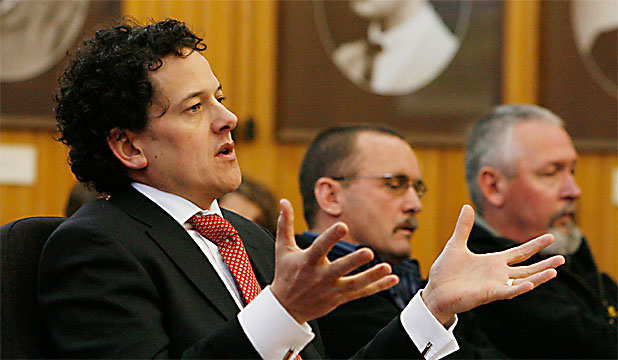
Lawyer Steve Rollo – “Quite how the police have arrived at a point where their leadership think it’s appropriate to try and cosy up to judges behind closed doors in this fashion is beyond me.
“If that kind of thinking sets in across the organisation then we’re all in deep trouble.”
Police however, through crown law, immediately appealed Justice Frances decision. The decision to appeal was unlikely to have been resultant of a noble intent on the part of senior officers to see justice done. Rather it seems to us a completely selfish act of self-preservation, again using tax payer money, perverting justice in the process.
As the New Zealand Herald’s David Fisher reported back in 2012, no doubt following a conversation or email exchange with police spin-doctor Grant Ogilvie;
Police national media manager Grant Ogilvie said police would not comment because an appeal on the High Court decision had been made.
Officers involved in the Red Devils operation face possible disciplinary or criminal charges over their actions.
It would seem now however that the police and Crown law may just have added to the list of crimes they have both committed whilst in the process of attempting to bury the carcass of this very smelly rotting behemoth.
Police had all along relied on what has now been establish was a complete lie, insisting on oath that they had received the blessing of a judge, falsely claiming that then Chief District Court judge Russell Johnson had agreed to the scam in operations Holy and Explorer. It was indeed fortunate for police that the judge then up and died and so was all too conveniently unavailable for comment or rebuttal of the evidence they used in the High Court.
However the police’s version of events were soon shown to be another likely sham. In November 2012 the New Zealand Heralds David Fisher covered the fallout from the hearing and Justice France’s decision:
Judge ‘didn’t want to know’ about false charge for Red Devil undercover operative.
David Fisher
November 24, 2012
Charges against members of the Red Devils motorcycle gang were dropped after allegations that police had misled the courts.
Evidence by a senior police officer about a judge helping stack up false charges to protect an undercover agent has clashed with details in a court file.
The details show testimony from the head of the police undercover programme pitted against a signed statement by a court manager.
The evidence was given in the “Red Devils” court hearing, in which charges against 21 people were dismissed after a High Court judge said police had “committed … fraud on the courts”.
Police were found to have manufactured a fake search warrant, created an invented signature of a court official to back it up then staged a false arrest of an undercover agent.
They then put an undercover agent through court with false charges – later claiming they did so with the blessing of Chief District Court Judge Russell Johnson.
Documents released by the High Court show testimony from police undercover programme boss Detective Senior Sergeant Warren Olsson in August about an earlier case said to show a precedent for colluding with a judge during an investigation.
Mr Olsson said an undercover officer from the 2002 Operation Kansas had a judge’s blessing to go through the court process under a fake name on charges which were later dropped.
Mr Olsson said “the permission of a District Court judge” meant the agent went before the court under an assumed name “until after the operation was finished whereby the charges were withdrawn”.
Mr Olsson said he had “a working knowledge” of Operation Kansas as head of the undercover programme and National Co-ordinator of Gang Intelligence.
But details released by the High Court in Wellington showed an alternative version of events.
A 2003 signed statement from then-Wanganui court manager Marcus Vettise stated Judge Mike Crosbie would not discuss the issue with the senior police officer who had sought a private meeting.
Mr Vettise said he escorted Detective Senior Sergeant Warren Smith to the judge’s chambers. He said it became clear “the operation was at risk due to the operative’s identity being revealed and that police were considering several options”.
Mr Vettise said the senior detective spoke of police considering laying a charge against the undercover agent.
He said “I distinctly remember at that point the judge holding up his hand, motioning for Detective Smith to stop and saying words to the effect ‘I don’t want to know about any of this’ or ‘I don’t want to know about that’.”
He said the meeting ended at that point.
The details were released by Justice Forrest Miller who said there was a strong public interest in matters relating to the performance of the police and the courts.
Justice Miller said he accepted it might lead to criticism of individual police but “the police will have the opportunity to comment on it”.
Police national media manager Grant Ogilvie said police would not comment because an appeal on the High Court decision had been made.
Officers involved in the Red Devils operation face possible disciplinary or criminal charges over their actions.
The operation was overseen by the Organised and Financial Crime Agency’s Detective Inspector Grant Wormald, who also ran the operation into Kim Dotcom.
Mistakes in that operation have led to a police inquiry into illegal spying by the Government Communications Security Bureau.
Steve Rollo, lawyer for some of the men arrested in the operation, said the Red Devils case raised serious issues for police.
He said no judge was able to give police permission to “commit criminal offences“.
“Quite how the police have arrived at a point where their leadership think it’s appropriate to try and cosy up to judges behind closed doors in this fashion is beyond me.
“If that kind of thinking sets in across the organisation then we’re all in deep trouble.”
Source: New Zealand Herald
Chief District Court judge Russell Johnson, who had passed away on July 23rd, 2011, was the obvious candidate for police to then belatedly claim that they had a conversation with, the courts so-called approval, as they say “dead men don’t lie” but in this case it was more a case of the police deciding that it was convenient for two police officers to lie on oath, their word against the word of a deceased judge who was obviously in no position to contradict the testimony.
110 False oaths
Every one is liable to imprisonment for a term not exceeding 5 years who, being required or authorised by law to make any statement on oath or affirmation, thereupon makes a statement that would amount to perjury if made in a judicial proceeding.
Source: New Zealand Crimes Act 1961
The police also undoubtedly knew that additional exculpatory evidence existed which would have resulted in the court of appeal upholding Justice France’s 2012 decision to stay the prosecutions had it been made available to the defence and the court and yet they succeeded in misleading the Court of Appeal, an event which now of course could well form the basis of another set of criminal charges.
So just who should be held responsible for the police’s criminal offending? In team LF’s opinion four names are in fact at the top of the list.
The commissioner of police, or rather at least three of them, Howard Broad, Peter Marshall and Mike Bush who all held the post during the length of the police investigation and the trial proceedings (including appeals) which of course date back to at least 2009. Then there are the four senior officers responsible for overseeing operations “Holy” and “Explorer”, (both particularly apt names given that both had been from the start little more than an unlawful fishing expeditions) and of course taking the credit and resultant promotions.
Police forged an illegible signature of a court deputy registrar and arrested Wilson. He appeared on several occasions before judges who all believed they were dealing with a genuine case.
Detective Superintendent Rod Drew and Detective Senior Sergeant Warren Olsson visited then-Chief District Court Judge Russell Johnston and believed police had his permission to go through with the unprecedented ruse. Soon after Operation Explorer ended, police sought to have Wilson’s charges withdrawn.
Source: New Zealand Herald
Superintendent Rod Drew, at the time overseer of all undercover operatives in New Zealand, now New Zealands management representative on Interpol’s virtual global task force. Rob Pope, the man who ballsed-up the Scott Watson murder inquiry, at the time deputy Commissioner of police, now retired.
Superintendent Malcolm Burgess, who at the time was the director of OFCANZ, the same police unit responsible for the Kim Dotcom raid and the unrelenting perjury during preliminary extradition hearings, now assistant commissioner of police.
Then last, but by no means least in the senior management line up Inspector Gary Knowles, at the time Tasman district commander, now Canterbury District commander, soon to be riding the gravy train as New Zealand’s police liaison officer in Thailand. Each and everyone of these men would have been aware of the extent and scope of the criminality of the the police undercover operation.
There are two others that should also be charged, Detective Senior Sergeant Warren Olsson and another of the corrupt players from the Kim Dotcom raid, who also went on to commit perjury during one of the those hearings, OFCAN’s Detective Inspector Grant Wormald.
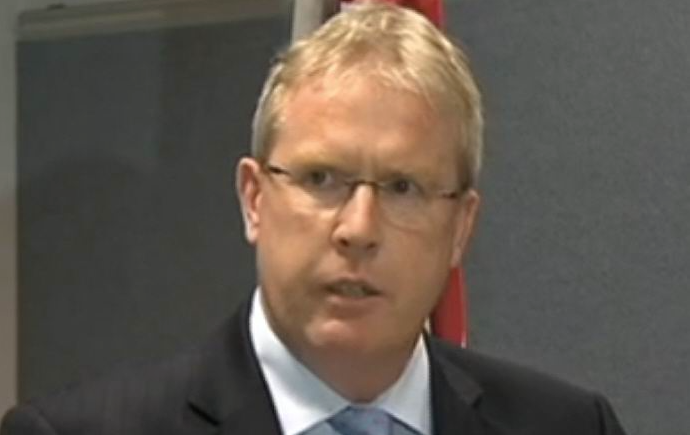
Detective Inspector Grant Wormald, an accomplished liar and no innocent when it comes to police indulging in “organised crime”
That then takes us back to where we started, the IPCA investigation into Gary Knowles behaviour in and around the allegations that he oversaw a malicious investigation and prosecution of a subordinate police officer.
The simple fact is that the IPCA would have known that Knowles and Burgess where both co-conspirator in the criminal red devils case so why was it that the IPCA’s chief investigator saw fit to allow Burgess to investigate Knowles, and then acquit Knowles of any wrong doing? Frankly an investigation and decision which can not now hold any credibility whatsoever.
These men, including the commissioners involved have willfully all engaged in a criminal conspiracy designed to allow police to embark on a fishing expedition prior to which they had absolutely no evidence of wrong doing. The fact the a so-called organised criminal group, aka the Red Devils motor cycle gang were the target is of no relevance. The nature of the targets enterprise is completely irrelevant, allegedly criminal or not.
The police target, using exactly the same criminal conspiracy, could have been anyone, lets say journalist Nicky Hager for example.
In fact in light of the police strategy in operations “Holy” and “Explorer” one would be completely justified in seeking discovery of absolutely everything the police submitted to the Courts in their attempt to obtain search warrants to search Hager, in the process seizing his computors, data storage devices and the investigative journalists personal records. If police failed to produce absolutely everything, perhaps citing the usual bullshit excuses, then it’s a given that they have acted criminally again.

Was Nicky Hager been yet another victim of the New Zealand police fake search warrant scams, search warrants obtained under false pretence to enable police to embark of fishing expeditions? LF has good reason to suspect that police sought the warrants against Hager for no other purpose than to protect fellow police officers.
The fact is that the New Zealand police have been using unlawfully obtained warrants for search and seizure enabling their fishing expeditions for years, the only difference is that after many years of legal struggle on this occasion they got caught almost red-handed, which in corrupt New Zealand was no easy task.
Every one of these senior police officers has since sought and obtained promotion on the back of these crimes and now hold even more powerful senior management roles within police. An extremely dangerous precedent to allow to stand unchallenged.
It’s not as if this were the first time that such criminal behaviour has been alleged against the New Zealand police. In fact ex police officer Patrick O’Brien has been allegeing that he was ordered to engage in remarkably similar corrupt criminal conduct as an undercover officer for many years now.
As Inspector Gary Knowles himself, as is claimed by the media spin doctors who assisted journo Blair Ensor, seems to have insisted:
Knowles said it was important that all police staff, regardless of their position, were held to account for their actions.
“Cases such as these are always challenging, and it is important that the difficult decisions we make as police officers stand up to all appropriate scrutiny when required.”
Source: Inquiry clears Superintendent Gary Knowles of wrongdoing
We here at LF completely agree with the sentiment expressed by the police media section spin-doctors posing as Gary Knowles, every New Zealand police officer needs to be held to account for their actions. There’s just one rather large problem however, it’s a sentiment that’s never really progressed beyond being just that, a sentiment, or rather politically convenient rhetoric and hyperbole.
This is nevertheless the perfect time for Gary Knowles and his criminal co-conspirators to stand up and be counted, to face the music just as every other New Zealander accused of a crime is required to!
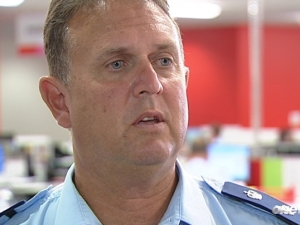
“Cases such as these are always challenging, and it is important that the difficult decisions we make as police officers stand up to all appropriate scrutiny when required.” – Bent District Commander Gary Knowles
The court’s decision to call the police behaviour for what it was, criminal, then stay the police prosecution for a second time is extremely significant. Not since the early 1990’s and the staying of charges against two teenage boys, who police alleged had murdered a rural veterinary surgeon whilst stealing his vehicle, has a New Zealand court acted so decisively against the New Zealand police’s abuse of civil rights, process and outright corruption. Thus this case thankfully likewise sets yet another benchmark.
What is now needed however is for the police officers responsible to be charged with the criminal offending. To be held to account so that the New Zealand public can slowly begin to regain trust in an instrument of justice that has been infested with corruption for well over thirty years.
Team Lauda Finem again call on the New Zealand government to immediately establish a Royal Commission into New Zealand Police Corruption, a Commission without limitation in its scope that is empowered to order the prosecution of any police officer it finds has acted corruptly and is fit to stand trial, serving or retired.
Footnote: Rodney Drew and Gary Knowles where both a party to the New Zealand polices criminal offending, certainly in this case, Drew now serves on an international policing body and Knowles is about to be tasked with representing the New Zealand police in Thailand as liaison officer.
In light of the circumstances surrounding the Red Devils case neither are fit to serve in such important internationally prominent police management roles, nor are they fit to continue serving as police officers.
LF trusts that the Thai authorities suggest that New Zealand put forward a more suitable candidate and that Drew and the New Zealand Government see the wisdom in his resigning his commission on the Virtual Global Task Force (VGT).
Bibliography/References
Court files – Red Devils – police criminality:
Police behaviour in Red Devils gang case possibly criminal, says judge (May 23, 2015, Jonathan Carson, Nelson Mail)
Police broke law in Red Devil’s case (May 22, 2015, Jared Savage, New Zealand Herald)
Lawyers argue for Red Devils case to be thrown out (May 5, 2015, Jonathan Carson, Nelson Mail)
Patched Red Devils in clear (March 13, 2015, Jonathan Carson, Nelson Mail)
Some Red Devils charges are likely to be dropped (Feb 24, 2015, Jonathan Carson, Nelson Mail)
Red Devils knocked back in court (4 July 2014, Brendan Manning, New Zealand Herald)
Evidence conflicts with court records (Nov 24, 2012, David Fisher, New Zealand Herald)
Lawyer wants pay after court ‘sting’ (Oct 28, 2012, Ian Stewart, Sunday Star Times)
The devil’s in the detail (Oct 26, 2012, thejackalman.nl)
Editorial: Police action slap in face for judiciary (Oct 26, 2012, New Zealand Herald)
Gang charges thrown out after fake prosecution (24 October 2012 Rebecca Quilliam, New Zealand Herald)
Media – compromised IPCA investigation – Knowles/Burgess
Inquiry clears Superintendent Gary Knowles of wrongdoing (May 23, 2015, Blair Ensor, The Christchur Press, stuff.co.nz)
Inquiry into top cop’s conduct (Nov 22, 2014, Blair Ensor, stuff.co)
Handcuffed for riding on the footpath ( August 18, 2014, Anne Clarkson, Stuff.co)
Ex-cop faces single charge (June 24, 2014, Timaru Herald, stuff.co.nz)
Two assault charges against police officer withdrawn (June 24, 2014, David Clarkson, courtnews.co.nz)
Former police officer denies assault charges (March 4, 2014, David Clarkson, The Christchurch Press)
Police complaints going more public (Feb 20, 2013, Blair Ensor, stuff.co.nz)
New constable settling in (October 10, 2007, Police Media office, Timaru Herald)
Misc Material
Board of management – Virtual Global Taskforce (Rodney Drew, National Manager Criminal Investigations Group, Detective Superintendent, New Zealand Police
Law Ministers Statement on Chief Judge Russell Johnson ( National party spin machine)


No Comments
Just a quick note re Hartnell assault matter the time for laying a common assault charge under section 9 of the Summary Offences Act 1981 is now 12 months per section 25 of the Criminal Procedure Act 2011. Obviously I don’t know the timings but keep up the good work. Wormald has been bent and more than just a little economical with the truth when giving evidence in Court for many years. Wormald broke all the rules and lied on oath in the Dotcom case in order to cosy up to the FBI with a view to getting a favourable recommendation from the FBI re the NZ Police liaison position in New York, damn the piece of s..t ended up in Nelson.
Update: NZ police have finally been told by crown lawyers that their corruption has resulted in a very expensive failed prosecution and theres absolutely no chance of a successful appeal, although they are attempting to spin the story, with the usual bullshit propaganda from bent cop Burgess – http://www.nzherald.co.nz/nz/news/article.cfm?c_id=1&objectid=11464391
After watching NZ crickets amazing run of form since NZ players were fist rumoured to be involved, have you guys got anymore coming on the Cairns, McCullum subject? or has your source been killed off like John Matheson when he said on radio live weekend sport that it goes to the highest levels in the sport and beyond, he has names and is working on a big story to reveal all, a week later he has a heart attack!
How do I send info to LF to expose bent pigs?
It is very sad. The most sad thing to my mind is that we as living human beings have the most basic of all human rights to love the law. These dirty filthy scumbags hidden behind police uniforms are in fact the agents of the destruction of our economy and society. They are International Human Rights criminals of the very worst kind and should be prosecuted as International Criminals.
Lauda Finem can no longer be reached via the old email address [laudafinem (at) bigpond (dot) com]. Currently if readers wish to send us information they can do so using this comments area. Please provide a genuine email address and contact telephone number (landline) and one of the LF team will be in touch. Comments containing requests and personal contact details are not published.
Do not send confidential information until you are given specific details of one of our new incrypted email services with instructions on how and when to send material.
LF also requires more than mere allegations, we need at least some evidence, the more the better; especially if the team is required to go down the path of investigating readers claims of wrong doing.
If your case is straight forward and or you possess all the evidence required to prove your allegations then you will be asked to present a precis explaining the allegations made in which you reference the documentary evidence supplied ie Exhibit “a”, Exhibit “b” and “c” etc (similar to an afidavit in form).
Unfortunately Team LF is now at a point where we are unable to waste any time whatsoever investigating allegations that are general in nature, mere rumour, opinion or personal speculation. If you would like us to work on your story then we need to know that you yourself are serious and have done at least done some background work of your own, we are after all not a free legal service, nor do we claim to be.
Regards
The Team @ Lauda Finem
I wonder what the head of Timaru’s corrupt Police would say about this article – Marion Neil. Word amongst the boys in blue there is she’s been pulled from the top job until they hope the dust settles on another of their great fuck ups.
Would that be the same Detective Sergeant Marion Neil, formally of Ashburton? Team LF would love to hear any information thats been circulating, the reason for the cops wanting the dust to settle rather than have the sun set on Detective Neils dirty police career. http://www.radionz.co.nz/news/regional/107787/site-blessed-where-czech-tourist's-body-found
More Timaru Police resigning over Timaru Police corruption. Funny how they never get sacked.
Even funnier how they never go to jail.
NZs biggest legal gang! Armed and highly dangerous.
I would have thought that by now the police would have realised that the means dont justify the ends. If they want to enforce the law, they have to work within it. So they diddle the system, then don’t pay the lawyer that they mislead??? Hell hath only one fury more vindictive than a woman scorned, and that fury belongs to a lawyer!
With regard to the police deliberately conspiring to pervert the course of justice and committ a fraud upon the New Zealand court in the covert surveillance of the Red Devil Motorcycle club on Nelson, the question must be asked do the Police have such little regard to the Justice system and think nothing of breaking the Laws they are supposed to uphold as a matter of course, how frequently are they abusing the system and how many people are in prison because of this deliberate misuse of the law?
Woz
If John Key had not put Mike Bush in charge would any of this nonsense be occurring to the same degree? On radio talk back not so many years ago Ross Meurant ex red squad described the NZ police e as totally corrupt. I am of the view that John Key managed to make “totally corrupt” reach into greater heights than even Ross Mehran could imagine. This Mike Bush attended the funeral of a massive criminally corrupt cop who set up Arthur Alan Thomas, with a police honour guard. This was obviously to advise police and NZ EARS that these supremely corrupt police would not only be honored but allowed to get away with whatever they liked. In this case according to the 9 years investigative research by Greg Hallett the Crewe murder was at the hands of a corrupt cop. Named by Greg Hallett. A corrupt cop also happened to wear a masonic apron of presumably the paedophile mass murder branch set in place by Lord kitchener in around 1910. Which further connects this John Key to these paedophile sodomite mass murderers. Who Mike Bush likes to honour with a police honour guard because the disgusting scum bag getting buried shut his mouth. Mike Bush should go.